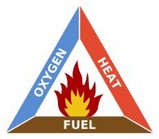Blog
Subscribe
Join over 5,000 people who receive the Anecdotally newsletter—and receive our free ebook Character Trumps Credentials.
Categories
- Anecdotes
- Business storytelling
- Collaboration
- Communication
- Corporate Storytelling
- Culture
- Decision-making
- Employee Engagement
- Events
- Fun
- Insight
- Leadership Posts
- News
- Podcast
- Selling
- Strategy
Archives
- April 2024
- March 2024
- December 2023
- November 2023
- October 2023
- September 2023
- August 2023
- July 2023
- June 2023
- May 2023
Years
Ignite your story telling
 When it comes to being an effective fire fighter, fire science has come up with the fire triangle. The fire triangle is a simple model which says that fire requires Fuel, Heat and Oxygen to burn. These three elements form the sides of the fire triangle. Take any one of these sides away and the fire is unable to burn.
When it comes to being an effective fire fighter, fire science has come up with the fire triangle. The fire triangle is a simple model which says that fire requires Fuel, Heat and Oxygen to burn. These three elements form the sides of the fire triangle. Take any one of these sides away and the fire is unable to burn.
In the same way, Doug Lipman has presented what I think is a great (and useful) model for how to be an effective story teller. He calls it his Story triangle. Like with the fire triangle, take any side away from the story triangle and you will have an ineffective story. The sides of the story triangle are:
- Clarity on “The most important thing” to you about the story
- Clarity on your intention towards your audience
- Using your imagination in all forms. eg: Auditory, Visual and Kineasthetic
As we will explore in our From story disaster to story master workshop (September 20th Melbourne, and 21st in Sydney) becoming a better story teller hinges on prospecting (being able to find stories), patterns (understanding some of the common forms story takes) and performance. I think Doug’s story triangle is a great way to become more mindful and effective in the delivery and performance of story.
About Andrew Rixon
Twitter •
Comments
Comments are closed.
What a useful model, thanks for posting about it.
And your 3 P structure is a great way to summarize the core skills needed.
Thanks for enlarging my thinking and offering up such helpful thoughts!
Thanks for your comment Michael.
I’d love to hear how you have been using story telling?
Andrew – sorry to be so slow in my reply. Such is life.
Story telling has been my essential tool for challenging how my clients and audience participants think about branding and its relevance.
My blog has been a living laboratory where I have put forth what one commenter calls “brand parables”. The goal has been to provoke conversation on the part of readers who see themselves in the story.
Thanks for asking!